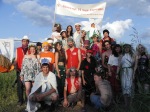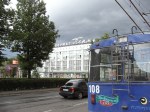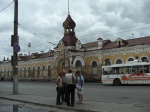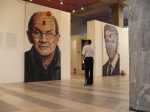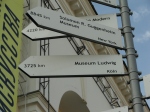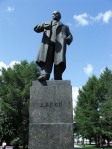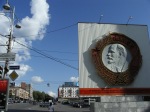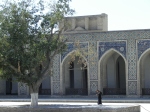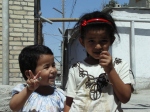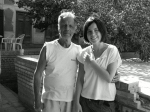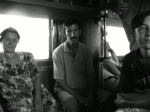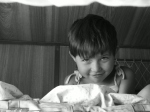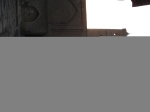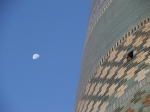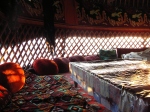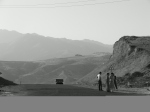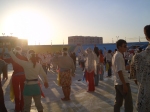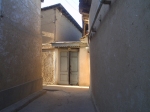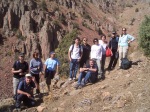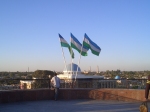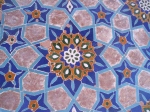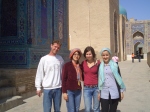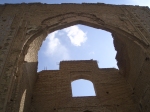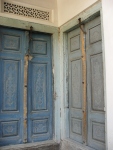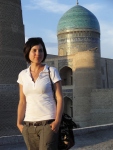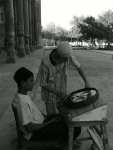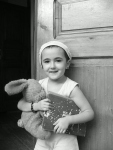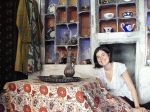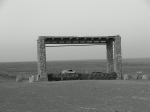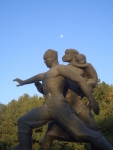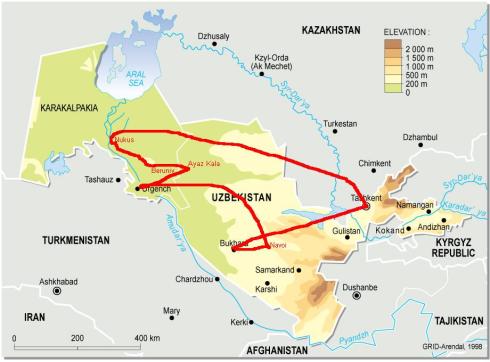Now over a month has passed since my last entry and I have to catch up. I have travelled some 10.000 km in this passed weeks and seen and experienced so much new that I hardly know where to start.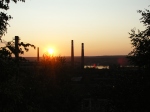
After the summer expedition through the Urals on the traces of the Gulag,, I had little time to reflect. Now there is more space for it, since I still have an essay due for the brochure that is going to be published on the outcomes of the summer school. Besides that a very interesting film was shot, by a guy that accompanied us during the trip and who sought to capture especially the many interviews that have been conducted during our journey. My role as I found out today is now to take care of the German subtitles, so that the film can be shown to a German audience as well. I do not trust my Russian skills that much, yet, but here they seem to be convinced that I can do it. We will see.
Transsib and the spirit of “living on a train”
Now to my trip to Buryatia and beyond. On 11 August I started the real Transsiberian journey. I crossed the Urals and the border between Europe and Asia. Not that it would be at all noticeable. Still for me this is the essence of Russia: this encounter between Eastern and Western cultures. This time I had a platskartny billet, and that meant less comfort. I found myself in midst a compartment with 55 other people who live, eat, sleep and walk around this 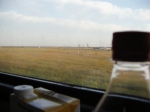 restricted, but surprisingly clean space for several days. There were little kids, even cats and dogs and everywhere it smelled of food, especially of fish when we arrived at the Baikal where everyone was eager to buy the popular dried fish “Omul” on the platforms. Right away, I was welcome by the fellow passengers in my immediate surroundings, some of whom had already been on the train since Moscow and were even travelling as far as Vladivostok. I
restricted, but surprisingly clean space for several days. There were little kids, even cats and dogs and everywhere it smelled of food, especially of fish when we arrived at the Baikal where everyone was eager to buy the popular dried fish “Omul” on the platforms. Right away, I was welcome by the fellow passengers in my immediate surroundings, some of whom had already been on the train since Moscow and were even travelling as far as Vladivostok. I 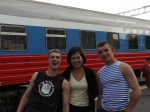 was lucky with them, because they remained the same and did not constantly change as further down the compartment. I realized how informal and easy-going t simple Russian people treat each other on these trains. They addressed each other by their first names and somehow after some days at least in our bunk area we had already become something like a temporary
was lucky with them, because they remained the same and did not constantly change as further down the compartment. I realized how informal and easy-going t simple Russian people treat each other on these trains. They addressed each other by their first names and somehow after some days at least in our bunk area we had already become something like a temporary 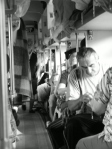 family. Food was being shared, in the evenings there was a lot of vodka drinking. Especially the marine soldier, Sascha, was a funny fellow who animated everyone else. We played cards, drank and discussed a lot of things passionately until late, until those around us who wanted to sleep rightly started to complain. Then there was Lena, a really nice girl in my age, who had lost her first employment in Moscow and was now on her way to Kamchatka in order to hike and change perspectives, as I guessed. We got along immediately and she explained me when I did not understand things.
family. Food was being shared, in the evenings there was a lot of vodka drinking. Especially the marine soldier, Sascha, was a funny fellow who animated everyone else. We played cards, drank and discussed a lot of things passionately until late, until those around us who wanted to sleep rightly started to complain. Then there was Lena, a really nice girl in my age, who had lost her first employment in Moscow and was now on her way to Kamchatka in order to hike and change perspectives, as I guessed. We got along immediately and she explained me when I did not understand things.
The scenery did not change much during 3 days of travelling. Sometimes there were pine, most of the time endless birch forests. We crossed giant rivers, drove past villages and we stopped in cities, whose names I had never heard before. The shopping trips on the platform were always a big highlight, especially when you could catch some fresh air every 5 h or so. I was impressed, especially by the nice buildings of the stations in Novosibirsk (which apart from that due to my bible, the lonely planet, is not worth visiting being one of the most dubious Russian cities), 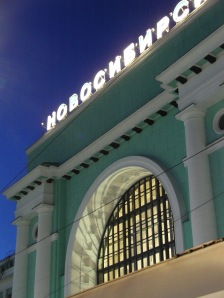 Krasnoyarsk (one of the wealthiest regions of Russia) and of course Irkutsk. To be honest before hopping on this train the idea of 3 days and 3 nights horrified me, but actually the time flew by and I indeed enjoyed it, since when I was lucky to be at the window side I found much time to think and read. And even more importantly, I had the chance to explore Russian culture, which in my opinion does not reveal itself better and in a more intimate context than travelling as the only foreigner in the platskartny compartment of a Russian transsibirsky magistral.
Krasnoyarsk (one of the wealthiest regions of Russia) and of course Irkutsk. To be honest before hopping on this train the idea of 3 days and 3 nights horrified me, but actually the time flew by and I indeed enjoyed it, since when I was lucky to be at the window side I found much time to think and read. And even more importantly, I had the chance to explore Russian culture, which in my opinion does not reveal itself better and in a more intimate context than travelling as the only foreigner in the platskartny compartment of a Russian transsibirsky magistral.
When I had almost arrived in Ulan-Ude, having been glued to the window for hours watching the wonderful landscapes of Lake Baikal and the mountains around it, I became almost sad about the fact that you can do certain things only once in life, such as going for the first time on a Transsib trip, experience this thrill, excitement and fascinate.
Russian individuals
I have met the most diverse people so far. If most of the encounterings were wonderful and really positive experiences of Russian “gastoprimsvto” (hospitality), there were also less pleasant but interesting ones, such as two guys from the Russian Far East I met on the train as well. They had met Sascha and Oleg, my bunk bed neighbours, in the corridor and found something in common in the fact that they all had been serving in the army and therefore decided to drink together one evening. The one of the two was a tall, quite good-looking fellow, but he was totally drunk and in a very sentimental mood, nearly close to tears. When I asked the others, they told me that he had found out that one of his best friends had been killed the day before. I was pretty shocked and prepared for being understandable and everything, but when I figured that he was actually looking for specific consolation I tried to get away and talked to his companion, Dima. This guy looked quite like a boxer or something and alone at night I would not have appreciated an encountering with him. Since I was in company I thought it was ok. He was delighted to be able to practice his English, which he proudly noted to have studied in prison. He sat for several years and is a fan of the army and Russia’s greatness. The longer I talked to him the more uncomfortable I grew, but for the sake of learning more about some dark aspects of this country I kept listening. After a few more shots he was quite fine with telling me that he actually does not remember anymore how many people he has killed in his life. Where he is from, he said proud, either you kill or you are being killed. It became clear that he had a very belligerent character. Wars are inevitable, he declared.
The omnipresent importance of the army
And Russians in particular were warriors, he said. There is great faith in the strength of Russian military and then Dima underlined that the majority of Russians were more than prepared to refrain even from certain amenities in life in order to pay tax many for the army. Another piece of wisdom he shared with me was that the Russian soul resembled a big bear who was quite peaceful when he slept, but as soon as someone tried to annoy him or wake him up he could become cruel and ruthless. The longer I stayed in Russia, the more I understood what an important and indispensable stance army and military have in this country. Especially surprised was I when by chance I peeked into a class-room of a Buryat village school that was a specialized room for military education. A big sign hung on top of the blackboard telling in red letters that “Patriotism and the belief in war duty is the foundation for the protection of the fatherland”. Around the class room there were big posters that explained the construction of a hand grenade, how to handle a machine gun and how to protect oneself using oxygen masks and air-raid shelters. The question that comes up is what kind of war do they prepare their young school kids for?
China – the big threat?
One other prognosis I heard not only of Dima was that one of the next wars would be initiated by the Chinese. Russians do not fear anyone as much as the Chinese. Also later on in Siberia I noticed the particular attitude Russians there have towards this neighbouring nation, with whom they however built up tight cooperation, as for example within the Shanghai Cooperation Organisation. They are afraid of Chinese taking over in Siberia. Looking at the demographic factor this is probably not an unjustified fear. I also noticed travelling around Baikal that most of the construction work, be it private building of datchas (summer houses), hotels etc., be it the State or local communities issuing road construction (many of the streets in the northern Baikal region are despite growing tourism still dust roads and travelling is very tiresome) are being executed by Chinese labour force. Once I was hitch-hiking with an Italian guy from the work-camp. We wanted to get to a place in the middle of the Eastern shore of the lake and the only one who stopped was a Chinese truck. It was quite an adventure, because the Chinese fellow did not speak a word of Russian, not mentioning any other language. Consequently communication was impossible and the poor fellow could not even point out on a map where he was going to. We found out later that he was carrying asphalt for the street and was just travelling back and forth the same street, therefore he did not know anything else. Unfortunate for us, after a relatively short long distance he just let us out at the furthest end of the asphalted new street. We were in the middle of nowhere and did not how to continue further, neither did we know whereabouts we where and how far it was to the next settlement. The entire team of Chinese construction workers who were the only people on the spot remained speechless when asked, for nobody understood anything else but Chinese. Eventually we were picked up by a Russian Volga with chatty people inside who nevertheless charged us for taking us further.
Ulan-Ude, the capital of Buryatia
Having arrived in Ulan-Ude, the capital of the autonomous Republic of Buryatia and the city with the biggest Lenin head in the world, I immediately immerged into the work-camp, organized by the NGO Siberian Creative Group. 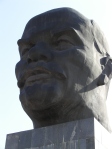 The first week was almost entirely reserved for a seminar on intercultural and human rights issues. I almost regretted having signed up for this project since my real interest was in Buryat culture, the region, the people, their language and religion and not listening to topics I heard many times at university. Although the weather was beautiful outside we spent our days inside an alternative theatre. That was a little sad, also due to dense programme I found little time to stroll around Ulan-Ude. The group was quite fun, the majority Europeans (of course Germans), some Russian (from other regions) and a few Buryat participants. I was living with one of the Buryat participants, Ayuna, in the empty flat of her aunt.
The first week was almost entirely reserved for a seminar on intercultural and human rights issues. I almost regretted having signed up for this project since my real interest was in Buryat culture, the region, the people, their language and religion and not listening to topics I heard many times at university. Although the weather was beautiful outside we spent our days inside an alternative theatre. That was a little sad, also due to dense programme I found little time to stroll around Ulan-Ude. The group was quite fun, the majority Europeans (of course Germans), some Russian (from other regions) and a few Buryat participants. I was living with one of the Buryat participants, Ayuna, in the empty flat of her aunt.
Buryat culture and identity
Anyway, it turned out to be not that bad after all. We received some information on the culture of the Buryat, an ethnicity that is most of all related to the Mongolians and in the majority of Buddhist belief. The ethnic Buryats are however in the minority of the overall population of the republic. There was an expert who spoke to us about the particularities of the Buryat language, a Turkic language that has been and still is subdued by state authorities. Although it is peoples’ first language on the countryside it is still not widely taught in schools. I found it particularly astonishing that when I asked for a study book in the city’s bookshops, it was impossible to get hold of one. Another expert talked to us about the history of Buryatia. Never was I taught that much about the Russian colonization history and I became aware of for the first time that the Russian Federation might indeed be one of the last remaining empires. To listen to this historian, who was clearly passionately dedicated to Buryat identity, made it clear how hard their destiny has been and still is in front of the Russian colonizer and how hard they have been fighting to avoid assimilation. Another plus was the acquaintances with two local (ethnic) Russian girls, that are political and human rights activists. They had a lot of stories to tell about the abuse of power by authorities and the lack of freedom of speech. They are facing themselves a trial having been accused of geminating “extremism”. I learnt a lot from them and was surprised to see how they defended the Buryat cause going as far as demanding a referendum for Buryats to decide on self-determination. All in all, the seminar turned out to be a passable preparation for our two-week journey through Buryat villages.
Travelling through Buryat villages
However, it was something totally different when we were actually in the villages. Despite a clear lack of organization, a number of misunderstandings with locals and mishappenings during our cultural evenings that we organized in the villages, constant problems with the registration of our passports (the law says that every 3 days you are in a new place you need to register) and unusual living conditions, I can say for myself to have enjoyed it a lot. I am not so sure about the other participants who maybe came with bigger more romanticized expectations and were not prepared to be able to shower/wash completely in a banya once every 5 days. Also the food situation was complicated sometimes. Not a lot of fruit and vegetable, hence people quickly turning sick – me included. When we wanted to provide ourselves in the village shops which were mostly unofficial little businesses by local inhabitants, we found out that it was not very fair either to buy off their entire stock of fruit (anyway only apples), eggs etc. and leave nothing for the rest of the population.
It was interesting to see that Buryats, who were originally Nomad people living on cattle herding, have abandoned their Soviet time Kolchose-centered agricultural lifestyle. The big agricultural machines are rusting away outside on meadows, and locals returned to a more indigenous life style, thus hardly growing any crops or orchards for which the soil is anyway not fertile enough.
We slept most of the time in schools and stayed altogether in 4 villages in the southern region of Muchoschibirsk. The tiny villages, Bom, Nasartui and Hoschun-Uzur, had mostly not more than 300 inhabitants. Local people mostly welcomed us with great hospitability. People were especially keen to show us around in their local museums, which was a must even in the tiniest village, where it was located usually in a separate part of the school. It was good to see how proud they felt to tell us foreigners about their past, local particularities and traditions. Besides that we were constantly besieged by hordes of local kids who loved playing us and even more being entertained all day long.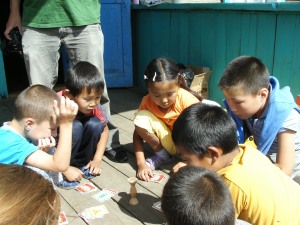 Besides that we executed little manual tasks for locals. The guys for example helped building a garage and also “helped” the village men drink vodka at various occasions, such under the pretext of going to harvest. We, the girls, were pulling out weed in the school gardens or building and painting fences, which was also a great way of feeling productive and quite meditative ;-). I enjoyed it. These were also the ways to get most easily in touch with locals and not as we had initially planned through formally organized and prior announced cultural evenings. We did those as well. There we talked about our respective countries, showed pictures, did quizzes, sang, danced and most of the times ended with a disco for the village youth (which for them obviously was the highlight). Sometimes these events were more and sometimes less successful.
Besides that we executed little manual tasks for locals. The guys for example helped building a garage and also “helped” the village men drink vodka at various occasions, such under the pretext of going to harvest. We, the girls, were pulling out weed in the school gardens or building and painting fences, which was also a great way of feeling productive and quite meditative ;-). I enjoyed it. These were also the ways to get most easily in touch with locals and not as we had initially planned through formally organized and prior announced cultural evenings. We did those as well. There we talked about our respective countries, showed pictures, did quizzes, sang, danced and most of the times ended with a disco for the village youth (which for them obviously was the highlight). Sometimes these events were more and sometimes less successful.
Anyway, the highlight for me was when we were actually invited into local homes. And what contrasts we encountered there. While the daily life style in this part of the world is still relatively primitive. An entire family lives normally in a one-room house. Running water does not exist. The sink is normally somewhere attached to the walls with a more or less big canister on top and a bucket underneath. The water they carry regularly from a local source. Toilets are as a rules in the Turkish style located outside. And this is not only in Buryatia the case, but Russian style wherever outside the cities. Quality standards vary considerably! In the middle of the home there is usually a big oven, essential of course during severely cold winters.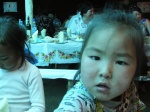 The houses are all wooden, but seem to be quite well traditionally isolated with moss. Despite this simple style of life, all young kids have the newest mobile phones and in the homes you find flat screen TV sets connected to satellite receivers and digital cameras, the most precious possessions next to the car, which however remains a rare luxury good.
The houses are all wooden, but seem to be quite well traditionally isolated with moss. Despite this simple style of life, all young kids have the newest mobile phones and in the homes you find flat screen TV sets connected to satellite receivers and digital cameras, the most precious possessions next to the car, which however remains a rare luxury good.
Another great coincidence was when we were invited to a local wedding. This was just the perfect way to celebrate and party with the people. 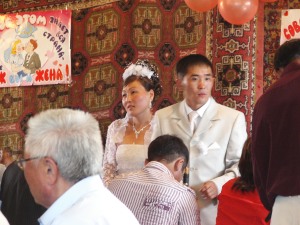 Fortunately, we did not witness the end of the wedding party, but considering the amount of vodka which had already been consumed in the afternoon, I was not surprised anymore that a significant proportion of the village men carry scars from broken noses. Of course we witnessed a lot of alcoholism in the villages, but it was not as bad as some of the other girls tried to imply, that it was dangerous at night to be out alone as a girl. Of course I did not provoke anything, but I seldom encountered real harassment by drunkards.
Fortunately, we did not witness the end of the wedding party, but considering the amount of vodka which had already been consumed in the afternoon, I was not surprised anymore that a significant proportion of the village men carry scars from broken noses. Of course we witnessed a lot of alcoholism in the villages, but it was not as bad as some of the other girls tried to imply, that it was dangerous at night to be out alone as a girl. Of course I did not provoke anything, but I seldom encountered real harassment by drunkards.
Endless steppes, freedom and the fatality of comparisons
In one of the villages I even got to ride a real Buryat horse – they are famous for their strength. And this was a real treat for me, because I had been dreaming of that even before coming. Wild horses I only once saw from a bus window. Nevertheless, also domestic horses were around everywhere trotting along wherever they felt like going. It was a wonderful feeling to gallop across the big wide meadows. 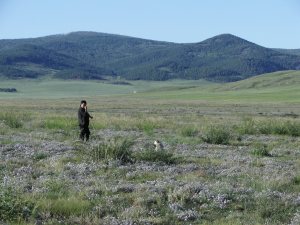 As a matter of fact I have seldom felt as free as walking or hiking outside these villages, which are located in the middle of endless steppes around them nothing but infinite landscapes, normally the next settlement at least 10 km away. It is a great wealth to have so much infinite land, that’s what I always tried to tell the locals when they asked me where life is better “here or in Germany?”. I don’t know how many times I have been asked that question. I have become more imaginative in my answers, but it remains a difficult question. Of course I feel more comfortable back in Europe, but isn’t it always difficult to compare so difficult settings and preconditions? Whether they believed me when I told them that I envy them for the vastness of their lands,
As a matter of fact I have seldom felt as free as walking or hiking outside these villages, which are located in the middle of endless steppes around them nothing but infinite landscapes, normally the next settlement at least 10 km away. It is a great wealth to have so much infinite land, that’s what I always tried to tell the locals when they asked me where life is better “here or in Germany?”. I don’t know how many times I have been asked that question. I have become more imaginative in my answers, but it remains a difficult question. Of course I feel more comfortable back in Europe, but isn’t it always difficult to compare so difficult settings and preconditions? Whether they believed me when I told them that I envy them for the vastness of their lands, 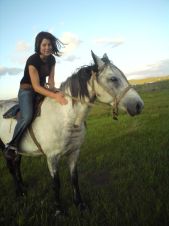 the purity and originality of the nature and that curiously I could feel more free here than in our densely populated cities – I doubt, but I hope at least they became a little prouder of their native land and less inclined to unfavourable comparisons.
the purity and originality of the nature and that curiously I could feel more free here than in our densely populated cities – I doubt, but I hope at least they became a little prouder of their native land and less inclined to unfavourable comparisons.
However, there remained always a questionable feeling of pity for some of the people. Many of them have never been to Moscow and the furthest they got to was to Ulan-Ude. They clearly have no picture of what Western life is like, but TV and other mediums suggest in one way or the other that their life is not as good. It is a shame, because there is so much potential out there and they do not have taken on the whole civilizational misery, yet.
Meeting the Lama
One of the last happenings in the villages was the encounter with a real Lama. He came from Mongolia and had a woman with him who translated into Russian. He ate with us dinner and was prepared to answer to any questions we had. It was clearly interesting, because I had an entire different image of a Lama. In Buryatia Lamas act a lot like Shamans. Therefore it turned out that those familiar with Buddhism were just waiting for him to receive us in  individual séances to make predictions and tell other particular insights. To some he told their Mantra, too. Although I am not that much into superstition, I enjoyed listening to his prayers in soothing Mongolian and found it nice what he told me and the way he gave me some piece of advice for the rest of this year. Moreover, I had to find 9 black and 9 white stones and had to throw them in his presence the next morning in my respective good and bad directions.
individual séances to make predictions and tell other particular insights. To some he told their Mantra, too. Although I am not that much into superstition, I enjoyed listening to his prayers in soothing Mongolian and found it nice what he told me and the way he gave me some piece of advice for the rest of this year. Moreover, I had to find 9 black and 9 white stones and had to throw them in his presence the next morning in my respective good and bad directions.
The magic Lake Baikal
After we came back to Ulan-Ude, we immediately set of the next day to Lake Baikal. Actually this trip was not really part of the work-camp anymore and the group had already become smaller. We spent a couple of really relaxing days on the border of this magic water. If it was not for the absence of mussels, salty water and palms, it could easily be mistaken for the seaside. There are sandy beaches with pine trees reaching the shore and waves breaking onto it constantly, creating a relaxing and soothing atmosphere. There are even sea gulls. The water is so clean and pure that you can drink it, if it is not close to a port. However, you become immediately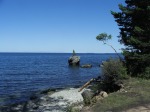 aware of its sensitivity and fragility, threatened as our entire planet by careless human pollution and littering. It is so unfortunate. But now it is still the time to enjoy Baikal in its uniqueness.
aware of its sensitivity and fragility, threatened as our entire planet by careless human pollution and littering. It is so unfortunate. But now it is still the time to enjoy Baikal in its uniqueness.
Only three of us, Michael from Germany, Inti from Italy and me continued further North with destination Sveti Nos, a peninsula famous for its natural beauty and high mountains. We had a great trip up there, spent a night in a marvelous private home, joined a beach party at night with the obligatory bonfire, but unfortunately reached only the very beginning of this huge national park. There was not easy moving there without private transport. There were only two options spending much longer there to allow enough time for hitch-hiking or chartering an expensive excursion. We decided to leave and keep it for the next time to return there.
Datsan
On my last day in Ulan-Ude, we visited a great Datsan (temple complex) called Ivolginsk. It is one of the most important religious centers of the Republic where a dozen of Lamas teach hundred young monarchs in Tibetan language with the goal to preserve old traditions, keep Buddhism alive in the Republic and assure its heritage in present-day orthodox dominated Russia. We enjoyed a great guided tour in English and learnt along the way some new details about Buddhism.
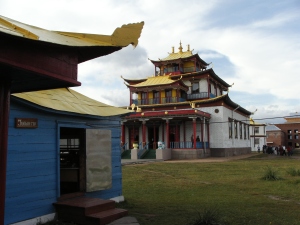
Travelling westwards again
After I left Ulan-Ude on the Transsiberian train “Baikal” and travelled again westward (my healthy direction according to the Lama), once more in very pleasant company (Kostja from Sankt Peterburg and Andrew from London). I made four stops on my way back to Perm. The first one happened to be the unofficial capital and old Cossack city, Irkutsk, where I visited the Decembrist museum I had already learnt a lot about during my Russian language lessons in Paris. I only had a few hours and did not more but stroll down the main streets, among them Ul Karla Marksa and Ul Lenina. As a matter of fact in 99 % of Russian cities the main streets are named identitcally. The second stop was in Yekaterinburg, a surprisingly young, thriving and modern city that bears much history at the same time, having been the place where the Romanov (Zarist) family was brutally killed by Bolshevists and thrown into a dysfunctional mine some 16 km north of the city in 1918. I stayed there with a friendly couchsurfing host, Lena.
The haunting city Magnitogorsk
Then I realized a plan that suggested itself to me while inspecting the Russian map on the train. I noticed that the city of Magnitogorsk was for Russian standards relatively close to Yekaterinburg, only (!) around 450 km southwards towards the Kazakh border. 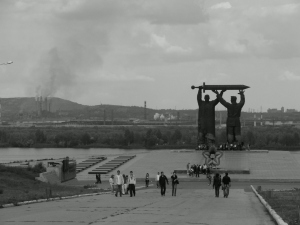 Since I have read a book sometime ago about the unbelievable efforts to found this city in the early 1930s, I was curious to visit it. As part of a giant Stalinist project under the dictum of creating a new civilization, the city was built up around one of the biggest metallurgical plants in the world – in the middle of nowhere near the Kazakh steps. Generations of forced labour lived for decades in barracks until the city grew out of nothing, under great pressure from the center in Moscow and under disfavourable conditions and complications.
Since I have read a book sometime ago about the unbelievable efforts to found this city in the early 1930s, I was curious to visit it. As part of a giant Stalinist project under the dictum of creating a new civilization, the city was built up around one of the biggest metallurgical plants in the world – in the middle of nowhere near the Kazakh steps. Generations of forced labour lived for decades in barracks until the city grew out of nothing, under great pressure from the center in Moscow and under disfavourable conditions and complications.
“Mushestvo” or Russian manliness
Present-day Magnitogorsk is still a haunting place, with the majority of the population depending and working for the metallurgical “Kombinat”, which has also been effected by the late crisis, having turned down production to 50%, according to rumours. I visited the Soviet Great Patriotic War Memorial, Tyl Frontu, which is the most enormous one I have ever seen, overlooking the industrial panorama of the Kombinat beyond the river – impressive! In Magnitogorsk, I met Sergei and his sister Nastia who spontaneously became my tourguides. They were both really kind and sweet and showed me what there was else to see. Then they brought me to the train station, where Sergei told me during a last fare-well beer, that I should watch out for one thing in a man: amidst other qualities, he should be able anytime to go into a forest, chop a tree, make a fire, provide for me and assure survival. He then underlined that any Russian man who has been to the army could do this. Therefore I should consider that the Russians are not the worst option after all. I was glad however noticing that he was laughing while telling it, not taking himself too seriously.
Ufa – the capital of Bashkortostan
From Magnitogorsk I travelled by night train to Ufa, the capital of the autonomous and proud republic of Bashkortostan. I was thrilled by the fact that the native people, that means the indigenous Turkic Bashkir people, have been able to insist much more on the presence of their language in their daily lives as e.g. in Buryatia.  Thus, in Ufa all street names and signs are generally kept bilingual. Even the announcements in the bus station are in two languages. It was interesting to listen to this language and the local people, who when they are ethnic Bashkir even speak Russian with a clear accent. Moreover, I noticed the huge quantity of banners around the city with uniting slogans for the Russian nation – most likely sponsored by the government party “Edinaya Rossija”. The Russian Federation is not such an evident entity as it is mostly estimated in Western countries.
Thus, in Ufa all street names and signs are generally kept bilingual. Even the announcements in the bus station are in two languages. It was interesting to listen to this language and the local people, who when they are ethnic Bashkir even speak Russian with a clear accent. Moreover, I noticed the huge quantity of banners around the city with uniting slogans for the Russian nation – most likely sponsored by the government party “Edinaya Rossija”. The Russian Federation is not such an evident entity as it is mostly estimated in Western countries.
From Ufa I took a very boring bus back to Perm who stopped in at least one million villages. I was glad to be back eventually in Perm, which already feels a little like home. I am overwhelmed with impressions (therefore this never-ending entry) and yet some more work ahead of me for Memorial in the coming weeks.
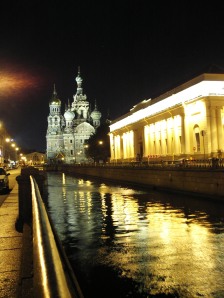 spend one week in St. Petersburg before starting the tour. I simply love being in this somehow enchanted city. It unites European elegance with cordial Russian hospitality and contradictory mentality. You can certainly compare it to Paris, but there is more water, more magic and more drama to the passage between history and presence. Without restraining myself I revel in art, architecture, poetry (Pushkin, Akhmatova, Blok…) and music of course. Petersburg in summer is a treat, especially the long and warm nights.
spend one week in St. Petersburg before starting the tour. I simply love being in this somehow enchanted city. It unites European elegance with cordial Russian hospitality and contradictory mentality. You can certainly compare it to Paris, but there is more water, more magic and more drama to the passage between history and presence. Without restraining myself I revel in art, architecture, poetry (Pushkin, Akhmatova, Blok…) and music of course. Petersburg in summer is a treat, especially the long and warm nights.


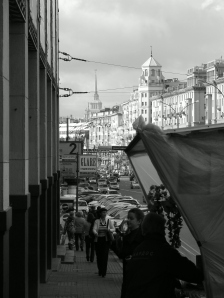
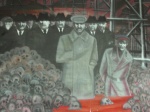
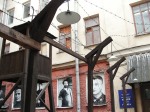 that the culture of memory in this country is ambiguous, but compelling enough to eventually claim its rightful stance. Patience is needed, but there are people out there with a good attitude.
that the culture of memory in this country is ambiguous, but compelling enough to eventually claim its rightful stance. Patience is needed, but there are people out there with a good attitude.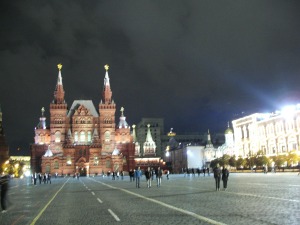
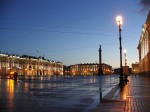 I believe there is no point in these comparisons – every of these places is unique. Whatsoever, I was very lucky to spend my very last days here in “Piter”, for it resulted in a smooth transition between Russia and Europe. Above all I would never have kept the city in such good memory, had it not been for my wonderful couchsurfing hosts, Yuri and Liza, who welcomed me in their room of an authentic Russian Komunalka (traditonal communal flat). Later on they told me that in this very room Aleksander Blok, the great symbolist poet, had spent one year of his life. I was delighted. They were among the most hospitable and generous people I have met.
I believe there is no point in these comparisons – every of these places is unique. Whatsoever, I was very lucky to spend my very last days here in “Piter”, for it resulted in a smooth transition between Russia and Europe. Above all I would never have kept the city in such good memory, had it not been for my wonderful couchsurfing hosts, Yuri and Liza, who welcomed me in their room of an authentic Russian Komunalka (traditonal communal flat). Later on they told me that in this very room Aleksander Blok, the great symbolist poet, had spent one year of his life. I was delighted. They were among the most hospitable and generous people I have met.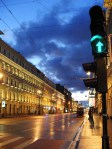 was absolutely stunning, especially the colours during the sunset. The skies above this city are magic. I will have to come back someday during the “white nights”. I also went to the Tsarist residence of “Peterhof”, outside the city located on the coastline facing Finland. The rest of my time I spent walking, exploring and finding the museum flats of famous poets and writers, such as Fjodor Dostoyevski, Aleksander Blok and Anna Akhmatov. The latter being a symbolic figure – for the beauty and tragedy of this country.
was absolutely stunning, especially the colours during the sunset. The skies above this city are magic. I will have to come back someday during the “white nights”. I also went to the Tsarist residence of “Peterhof”, outside the city located on the coastline facing Finland. The rest of my time I spent walking, exploring and finding the museum flats of famous poets and writers, such as Fjodor Dostoyevski, Aleksander Blok and Anna Akhmatov. The latter being a symbolic figure – for the beauty and tragedy of this country.
 restricted, but surprisingly clean space for several days. There were little kids, even cats and dogs and everywhere it smelled of food, especially of fish when we arrived at the Baikal where everyone was eager to buy the popular dried fish “Omul” on the platforms. Right away, I was welcome by the fellow passengers in my immediate surroundings, some of whom had already been on the train since Moscow and were even travelling as far as Vladivostok. I
restricted, but surprisingly clean space for several days. There were little kids, even cats and dogs and everywhere it smelled of food, especially of fish when we arrived at the Baikal where everyone was eager to buy the popular dried fish “Omul” on the platforms. Right away, I was welcome by the fellow passengers in my immediate surroundings, some of whom had already been on the train since Moscow and were even travelling as far as Vladivostok. I  was lucky with them, because they remained the same and did not constantly change as further down the compartment. I realized how informal and easy-going t simple Russian people treat each other on these trains. They addressed each other by their first names and somehow after some days at least in our bunk area we had already become something like a temporary
was lucky with them, because they remained the same and did not constantly change as further down the compartment. I realized how informal and easy-going t simple Russian people treat each other on these trains. They addressed each other by their first names and somehow after some days at least in our bunk area we had already become something like a temporary  family. Food was being shared, in the evenings there was a lot of vodka drinking. Especially the marine soldier, Sascha, was a funny fellow who animated everyone else. We played cards, drank and discussed a lot of things passionately until late, until those around us who wanted to sleep rightly started to complain. Then there was Lena, a really nice girl in my age, who had lost her first employment in Moscow and was now on her way to Kamchatka in order to hike and change perspectives, as I guessed. We got along immediately and she explained me when I did not understand things.
family. Food was being shared, in the evenings there was a lot of vodka drinking. Especially the marine soldier, Sascha, was a funny fellow who animated everyone else. We played cards, drank and discussed a lot of things passionately until late, until those around us who wanted to sleep rightly started to complain. Then there was Lena, a really nice girl in my age, who had lost her first employment in Moscow and was now on her way to Kamchatka in order to hike and change perspectives, as I guessed. We got along immediately and she explained me when I did not understand things. Krasnoyarsk (one of the wealthiest regions of Russia) and of course Irkutsk. To be honest before hopping on this train the idea of 3 days and 3 nights horrified me, but actually the time flew by and I indeed enjoyed it, since when I was lucky to be at the window side I found much time to think and read. And even more importantly, I had the chance to explore Russian culture, which in my opinion does not reveal itself better and in a more intimate context than travelling as the only foreigner in the platskartny compartment of a Russian transsibirsky magistral.
Krasnoyarsk (one of the wealthiest regions of Russia) and of course Irkutsk. To be honest before hopping on this train the idea of 3 days and 3 nights horrified me, but actually the time flew by and I indeed enjoyed it, since when I was lucky to be at the window side I found much time to think and read. And even more importantly, I had the chance to explore Russian culture, which in my opinion does not reveal itself better and in a more intimate context than travelling as the only foreigner in the platskartny compartment of a Russian transsibirsky magistral. The first week was almost entirely reserved for a seminar on intercultural and human rights issues. I almost regretted having signed up for this project since my real interest was in Buryat culture, the region, the people, their language and religion and not listening to topics I heard many times at university. Although the weather was beautiful outside we spent our days inside an alternative theatre. That was a little sad, also due to dense programme I found little time to stroll around Ulan-Ude. The group was quite fun, the majority Europeans (of course Germans), some Russian (from other regions) and a few Buryat participants. I was living with one of the Buryat participants, Ayuna, in the empty flat of her aunt.
The first week was almost entirely reserved for a seminar on intercultural and human rights issues. I almost regretted having signed up for this project since my real interest was in Buryat culture, the region, the people, their language and religion and not listening to topics I heard many times at university. Although the weather was beautiful outside we spent our days inside an alternative theatre. That was a little sad, also due to dense programme I found little time to stroll around Ulan-Ude. The group was quite fun, the majority Europeans (of course Germans), some Russian (from other regions) and a few Buryat participants. I was living with one of the Buryat participants, Ayuna, in the empty flat of her aunt. Besides that we executed little manual tasks for locals. The guys for example helped building a garage and also “helped” the village men drink vodka at various occasions, such under the pretext of going to harvest. We, the girls, were pulling out weed in the school gardens or building and painting fences, which was also a great way of feeling productive and quite meditative ;-). I enjoyed it. These were also the ways to get most easily in touch with locals and not as we had initially planned through formally organized and prior announced cultural evenings. We did those as well. There we talked about our respective countries, showed pictures, did quizzes, sang, danced and most of the times ended with a disco for the village youth (which for them obviously was the highlight). Sometimes these events were more and sometimes less successful.
Besides that we executed little manual tasks for locals. The guys for example helped building a garage and also “helped” the village men drink vodka at various occasions, such under the pretext of going to harvest. We, the girls, were pulling out weed in the school gardens or building and painting fences, which was also a great way of feeling productive and quite meditative ;-). I enjoyed it. These were also the ways to get most easily in touch with locals and not as we had initially planned through formally organized and prior announced cultural evenings. We did those as well. There we talked about our respective countries, showed pictures, did quizzes, sang, danced and most of the times ended with a disco for the village youth (which for them obviously was the highlight). Sometimes these events were more and sometimes less successful. The houses are all wooden, but seem to be quite well traditionally isolated with moss. Despite this simple style of life, all young kids have the newest mobile phones and in the homes you find flat screen TV sets connected to satellite receivers and digital cameras, the most precious possessions next to the car, which however remains a rare luxury good.
The houses are all wooden, but seem to be quite well traditionally isolated with moss. Despite this simple style of life, all young kids have the newest mobile phones and in the homes you find flat screen TV sets connected to satellite receivers and digital cameras, the most precious possessions next to the car, which however remains a rare luxury good. Fortunately, we did not witness the end of the wedding party, but considering the amount of vodka which had already been consumed in the afternoon, I was not surprised anymore that a significant proportion of the village men carry scars from broken noses. Of course we witnessed a lot of alcoholism in the villages, but it was not as bad as some of the other girls tried to imply, that it was dangerous at night to be out alone as a girl. Of course I did not provoke anything, but I seldom encountered real harassment by drunkards.
Fortunately, we did not witness the end of the wedding party, but considering the amount of vodka which had already been consumed in the afternoon, I was not surprised anymore that a significant proportion of the village men carry scars from broken noses. Of course we witnessed a lot of alcoholism in the villages, but it was not as bad as some of the other girls tried to imply, that it was dangerous at night to be out alone as a girl. Of course I did not provoke anything, but I seldom encountered real harassment by drunkards. As a matter of fact I have seldom felt as free as walking or hiking outside these villages, which are located in the middle of endless steppes around them nothing but infinite landscapes, normally the next settlement at least 10 km away. It is a great wealth to have so much infinite land, that’s what I always tried to tell the locals when they asked me where life is better “here or in Germany?”. I don’t know how many times I have been asked that question. I have become more imaginative in my answers, but it remains a difficult question. Of course I feel more comfortable back in Europe, but isn’t it always difficult to compare so difficult settings and preconditions? Whether they believed me when I told them that I envy them for the vastness of their lands,
As a matter of fact I have seldom felt as free as walking or hiking outside these villages, which are located in the middle of endless steppes around them nothing but infinite landscapes, normally the next settlement at least 10 km away. It is a great wealth to have so much infinite land, that’s what I always tried to tell the locals when they asked me where life is better “here or in Germany?”. I don’t know how many times I have been asked that question. I have become more imaginative in my answers, but it remains a difficult question. Of course I feel more comfortable back in Europe, but isn’t it always difficult to compare so difficult settings and preconditions? Whether they believed me when I told them that I envy them for the vastness of their lands, 

 aware of its sensitivity and fragility, threatened as our entire planet by careless human pollution and littering. It is so unfortunate. But now it is still the time to enjoy Baikal in its uniqueness.
aware of its sensitivity and fragility, threatened as our entire planet by careless human pollution and littering. It is so unfortunate. But now it is still the time to enjoy Baikal in its uniqueness.
 Since I have read a book sometime ago about the unbelievable efforts to found this city in the early 1930s, I was curious to visit it. As part of a giant Stalinist project under the dictum of creating a new civilization, the city was built up around one of the biggest metallurgical plants in the world – in the middle of nowhere near the Kazakh steps. Generations of forced labour lived for decades in barracks until the city grew out of nothing, under great pressure from the center in Moscow and under disfavourable conditions and complications.
Since I have read a book sometime ago about the unbelievable efforts to found this city in the early 1930s, I was curious to visit it. As part of a giant Stalinist project under the dictum of creating a new civilization, the city was built up around one of the biggest metallurgical plants in the world – in the middle of nowhere near the Kazakh steps. Generations of forced labour lived for decades in barracks until the city grew out of nothing, under great pressure from the center in Moscow and under disfavourable conditions and complications.
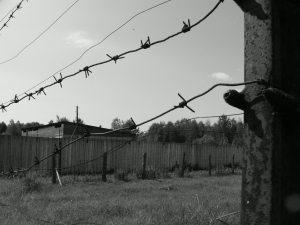
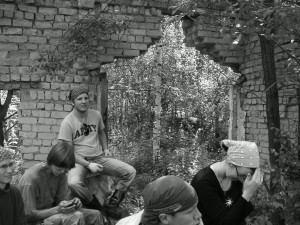
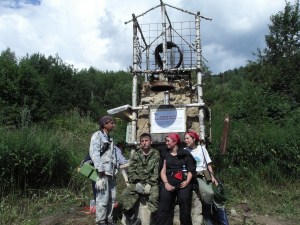
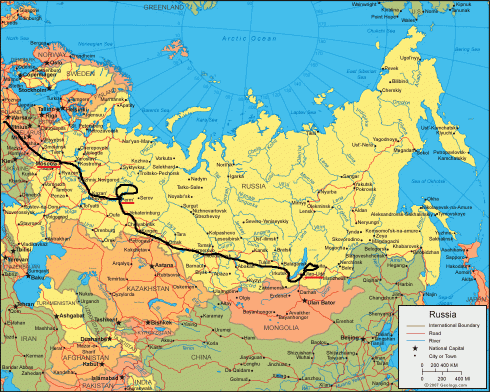
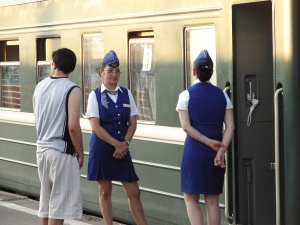
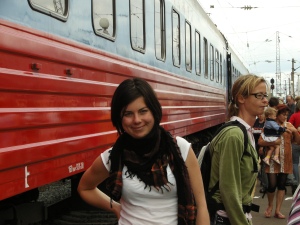
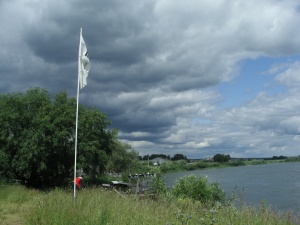
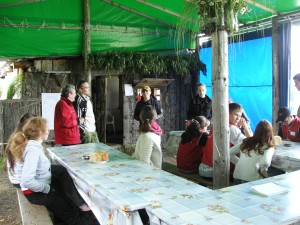 The main purpose of the camp was to exchange ideas about civil activism and to listen to experts from different sectors who made their way to the camp for a lecture. So almost every day for a couple of hours we had an external guest who talked to us about topics like civil rights and how to reclaim them, myths about democracy, human rights and press freedom in Russia, lessons of tolerance and contemporary education. These lectures were generally followed by long and passionate discussions and I was stunned how enlightened, self-critical and also sadly cynical these young Russians are (while I always had to bear in mind that they are not typical, for they represent a minority of active citizens). I could not help but learning a lot of things myself and relativising some of my ideas about Russia and generally speaking about the quatus quo of civil society in relation to the State.
The main purpose of the camp was to exchange ideas about civil activism and to listen to experts from different sectors who made their way to the camp for a lecture. So almost every day for a couple of hours we had an external guest who talked to us about topics like civil rights and how to reclaim them, myths about democracy, human rights and press freedom in Russia, lessons of tolerance and contemporary education. These lectures were generally followed by long and passionate discussions and I was stunned how enlightened, self-critical and also sadly cynical these young Russians are (while I always had to bear in mind that they are not typical, for they represent a minority of active citizens). I could not help but learning a lot of things myself and relativising some of my ideas about Russia and generally speaking about the quatus quo of civil society in relation to the State.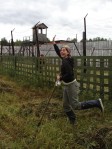 The other major part of camp life was manual labour on the territory of the former Gulag prisoner camp. The work was quite profane. For the girls it meant most of the time raking dry weed. However, the nature of the work and the unbearable circumstances with all the mosquitos around, plus being surrounded by barbed wire gave a funny feeling and made the experience how it could have been living the life of a political prisoner in such a camp more concrete.
The other major part of camp life was manual labour on the territory of the former Gulag prisoner camp. The work was quite profane. For the girls it meant most of the time raking dry weed. However, the nature of the work and the unbearable circumstances with all the mosquitos around, plus being surrounded by barbed wire gave a funny feeling and made the experience how it could have been living the life of a political prisoner in such a camp more concrete.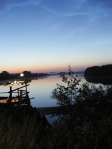 The last two days were quite spectacular. We had an inauguration for new volunteers one night ( I haven’t done so much crazy stuff since I was 16), where we had to perform stupid tasks such as walk with closed eyes through nettles, got really dirty and generally had a blast. But this was even topped by the farewell night which was meant to become a big karneval party. I hated the idea, but was surprised how much fun it became in the end improvising everything from scratch. Looking back it must have been one of the most skuril things I have done in a while.
The last two days were quite spectacular. We had an inauguration for new volunteers one night ( I haven’t done so much crazy stuff since I was 16), where we had to perform stupid tasks such as walk with closed eyes through nettles, got really dirty and generally had a blast. But this was even topped by the farewell night which was meant to become a big karneval party. I hated the idea, but was surprised how much fun it became in the end improvising everything from scratch. Looking back it must have been one of the most skuril things I have done in a while.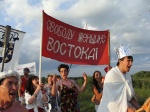 After these two weeks we all got to know each other quite well. I learnt that Russians in the beginning are quite reserved and skeptical, especially with strangers, but once they have taken confidence they become open-minded and –hearted. And I guess I have found a couple of real friends during this camp and I am looking forward to meeting with some of them during my time in Perm and during the expedition in two weeks, where we will try to explore the traces of the Gulag in the Urals together with a group of students from the “Forschungsstelle Osteuropa der Universität Bremen”.
After these two weeks we all got to know each other quite well. I learnt that Russians in the beginning are quite reserved and skeptical, especially with strangers, but once they have taken confidence they become open-minded and –hearted. And I guess I have found a couple of real friends during this camp and I am looking forward to meeting with some of them during my time in Perm and during the expedition in two weeks, where we will try to explore the traces of the Gulag in the Urals together with a group of students from the “Forschungsstelle Osteuropa der Universität Bremen”.